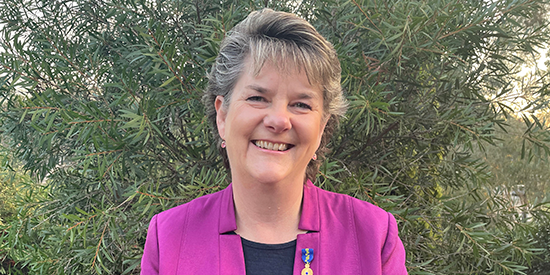Deakin professor recognised globally for excellence in nursing education
Research news
Summary:
- A Deakin researcher has been acknowledged by the world’s largest professional body for emergency nurses.
- Professor Julie Considine AO pioneered Australia’s first transition to specialty practice program in emergency nursing
- In a career spanning three decades, Professor Considine has held emergency nursing educator positions in hospital and university sectors
Professor Julie Considine AO from Deakin University’s School of Nursing and Midwifery has been globally recognised for excellence in nursing education by the esteemed U.S based Emergency Nurses Association (ENA).
Professor Considine, Chair in Nursing at Eastern Health and a member of Deakin’s Centre for Quality and Patient Safety Research in the Institute for Health Transformation (IHT), was awarded the Nursing Education Award at ENA’s 2024 Annual Achievement Awards.
Professor Considine says she’s delighted to be acknowledged by the world’s largest professional body for emergency nurses.
‘ENA has a membership of 50,000 emergency nurses and it’s a particular honour to receive this award outside the US,’ she says.
Head of Deakin’s School of Nursing and Midwifery Professor Nikki Phillips says the school is thrilled to see Professor Considine receive such a prestigious global award recognising a nurse who has made significant contributions to nursing education.
‘Professor Considine is a highly valued nurse leader in the University and at our Eastern Health partnership. To see her acknowledged for her local, national and international educational impact, especially within the emergency nursing profession, is a well-deserved honour,’ Professor Phillips says.
A long and successful career
Professor Considine’s research is aimed at improving the quality and safety of patient care by optimising clinical decision-making, increasing the use of research evidence in practice and ensuring effective models of service delivery.
In a career spanning three decades, she has held emergency nursing educator positions in both hospital and university sectors. She is a Senior Fellow of the Higher Education Academy (UK), holds an Australian Government Office for Teaching and Learning Citation for teaching-research-clinical practice nexus, and several University Vice-Chancellor’s Awards related to her teaching in emergency nursing.
In 2023, Professor Considine was awarded an Officer of the Order of Australia (AO) for distinguished service to emergency nursing, tertiary education and professional associations and she is one of eight recipients of the Julie Finucane Medal for Leadership in Emergency Nursing, the College of Emergency Nursing Australasia’s highest honour.
‘I started emergency nursing in 1991 and it has always remained a passion,’ Professor Considine says.
In 2000, she pioneered Australia’s first transition to specialty practice program in emergency nursing which created a pathway into emergency nursing for registered nurses from other areas of the hospital.
‘Those transition programs are now in almost every emergency department in Australia. It’s been instrumental in bolstering our emergency nursing workforce and drawing nurses into the area of nursing that I love,’ Professor Considine says.
In 2007, Professor Considine redesigned the postgraduate specialist emergency nursing curriculum for Deakin University, which remains the only Australian School of Nursing using Team-Based Learning as an active and collaborative education strategy in post-graduate nursing. Since 2000, Professor Considine has taught more than 2000 emergency nurses at Graduate Certificate level.
She’s led numerous studies of emergency nursing education and recently developed educational approaches for Australia’s largest nurse-led cluster randomised controlled trials of an evidence-informed patient assessment framework (31 emergency departments), and nurse-led protocols for initiating emergency care (30 emergency departments).
‘Australian emergency nurses are among the most well-educated in the world. Our scope of practice and level of skill means we care for some of the sickest patients in our hospitals. This is something we can be incredibly proud of,’ she says.
‘Emergency nurses are the first link in a long chain of clinical care for people in the hospital system and the work we do can literally save lives. And we do save lives. Every day.’
Find out more about Professor Considine's research
Visit Professor Considine’s Deakin profile
The text of this article is licensed under the Creative Commons Attribution (CC BY) 4.0 International license. We'd love for you to share it, so feel free! Please note that images, videos, graphics and logos are not covered by the CC BY license and may not be used without permission from Deakin University or their respective copyright holder. If you have any questions please contact researchcomms@deakin.edu.au. Thanks for reading!
You can find more stories like this at https://www.deakin.edu.au/research/research-news-and-publications. We ask that Deakin University and individuals are appropriately credited and that you include links back to this website. Quotes in this article can be extracted for other articles provided individuals are appropriately credited and you include a link back to the article URL.
Share this story

Key Fact
Professor Julie Considine AO was awarded the Nursing Education Award at ENA’s 2024 Annual Achievement Awards.
